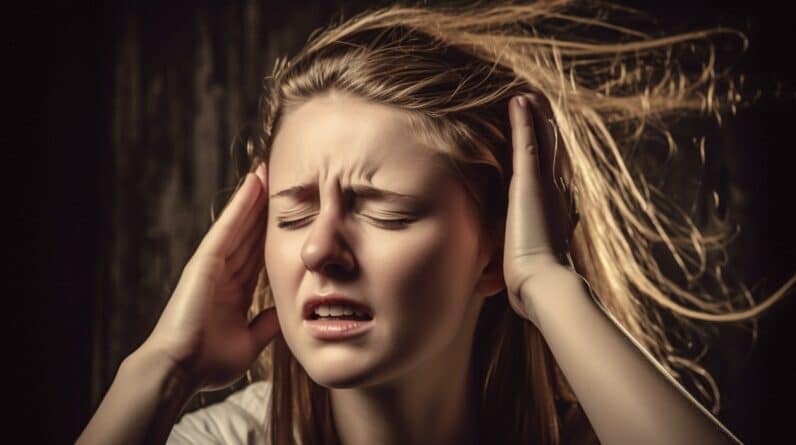
We may earn money or products from the companies mentioned in this post.
As an Amazon Associate I earn from qualifying purchases.
Introduction
Welcome! We’re going on a journey today, delving into two seemingly divergent topics that, upon closer scrutiny, may share intriguing commonalities—Tinnitus and Autism. Such potential interlocking patterns are the strands we’ll attempt to untangle as we continue with this examination.
Understanding Tinnitus
Picture this: a persistent buzzing or ringing noise in your ears, invasive yet invisible to anyone else. This is the reality for people living with tinnitus, a condition characterized by phantom auditory sensations. According to the American Tinnitus Association, tinnitus can strike anyone, regardless of age or general health—though it’s more common in older individuals and those with certain medical conditions.
The complexities of tinnitus go deeper, encompassing a vast array of potential triggers—including loud noises, specific medications, and even some medical conditions. Symptoms vary in severity, leading to differing impacts on individuals’ quality of life.
Are you seeking a potential remedy, something that could be prepared within the familiar comforts of your home? Then, you might find this related article on whether there is a home remedy for tinnitus quite engaging.
Understanding Autism
Navigating the multifaceted world of autism can feel like exploring a vast, intricate maze with ever-changing hallways. Autism is classified as a spectrum disorder, meaning it encompasses a wide range of conditions characterized by challenges with social skills, repetitive behaviors, speech, and nonverbal communication. To add to its complexity, each person with autism has a distinct set of strengths and challenges.
Ever heard that people with autism have an atypical auditory system? Some studies suggest that individuals on the autism spectrum process sound differently than neurotypical individuals, leading to unique auditory experiences. Consequently, it’s essential to carefully manage any other complications that might interfere with their auditory perception. Stay tuned as we delve into a deeper exploration of the potential connection between tinnitus and autism in the ensuing sections.
Tinnitus in Autism Patients
Think of the daily cacophony we navigate—traffic sounds, people talking and phones ringing. Now, imagine having Autism Spectrum Disorder (ASD) with sensory sensitivity and, on top of that, tinnitus amplifying phantom auditory noises. Quite an overwhelming situation, wouldn’t you say?
Studies indicate that individuals with ASD could be more prone to experiencing tinnitus compared to the general population. Researchers suspect that this increased incidence might be due to the unique sensorial processing systems present in people with autism. While empirical data supporting this connection is in its early stages, the world of medical research is peering into this intersection with growing interest.
Finding an effective remedy for tinnitus in autism patients is paramount. Anecdotal reports suggest some luck with a CBD treatment for Tinnitus. While not a one-size-fits-all solution, its potential in tackling other symptoms associated with ASD makes it a prospective candidate for managing tinnitus in autistic individuals.
So, what is the role of a remedy for tinnitus in managing this complex coexistence? Let’s unravel this intertwined conundrum!
Autism and Tinnitus: Addressing Misconceptions
In the murky waters of health and medical discussions, it’s easy for misconceptions to bloom. And the more intricate the topic, like the correlation between autism and tinnitus, the more prone it can be to misunderstandings.
One common myth is that only individuals with ASD can experience tinnitus. Not true! Remember, tinnitus can afflict anyone, regardless of age or medical prognosis.
Another misconception is that all autistic individuals have tinnitus. While there might be a possible higher incidence, not every person with autism experiences it. A clear distinction is necessary to ensure that every individual’s unique experience with these diverse conditions is acknowledged and treated appropriately.
Our exploration doesn’t stop here! We delve deeper into treatments next, along with risks and how to mitigate them. Stay engaged as we continue to unravel the intriguing complexity of tinnitus and autism.
Treating Tinnitus in Autism Patients
Do you remember Hans Christian Andersen’s story, The Ugly Duckling? No one expected the unwanted duckling to transform into a majestic swan, right? Similarly, tinnitus management in Autism Spectrum Disorder can seem daunting, but with the right strategies, progress can be transformative!
Generally, treating tinnitus involves addressing possible triggers and managing symptoms. It’s a similar case for those with autism. However, understanding the individual’s unique sensory experiences and ASD characteristics is key.
Anecdotal evidence suggests that hemp gummies for tinnitus could offer some relief. They’ve been considered an effective supplement due to their calming effect and potential antioxidative properties. Alternatively, you might want to explore the best supplements for tinnitus for more comprehensive options.
Remember, navigating this path requires patience. Like the slow staccato of waves upon a shore, progress may feel incremental yet in the grand scheme, it’s absolutely meaningful.
Possible Risks and How to Mitigate Them
Just like a grand symphony, managing tinnitus in autism is a complex interplay of various elements, each with its tempo and rhythm. Understandably, there could be possible risks. Therefore, before diving into the process, it’s essential to understand what they are and how to mitigate them.
Being aware of the “Tinnitus Severity & Risks” can help caregivers anticipate potential challenges and prepare accordingly. Suppose the jigsaw puzzle feels too overwhelming. In that case, specialists and supportive communities, such as [Autism Speaks] and the [American Tinnitus Association], can be invaluable resources in this journey.
Conclusion
Similar to the alternating rhythm in a jazz ensemble, the chord struck by autism and tinnitus indeed invokes a complex melody. Yet, it’s through understanding the notes and rhythms, appreciating the science, and harnessing our collective navigational skills that we unveil an optimistic crescendo—if not an absolute cure, certainly a melody of better management and enhanced quality of life. After all, isn’t life a grand symphony written in unique notes?
Tinnitus And Autism - Frequently Asked Questions (FAQ)
While research into the connection between autism and tinnitus is ongoing, there’s no proof that autism directly causes tinnitus. However, many individuals with autism do report experiencing tinnitus, suggesting a possible link.
Yes, there are proposed treatments for tinnitus in autism patients. IT can range from medications to dietary supplements, and even therapy. An example includes the use of hemp gummies for tinnitus and other supplements for tinnitus.
Current research suggests unique sensory experiences in individuals with Autism might contribute to an increased incidence of tinnitus. Anecdotal evidence also shows a higher occurrence of tinnitus among individuals with Autism.
Some studies report a higher incidence of tinnitus among individuals with Autism compared to the general population. However, further research is needed for definitive answers.
Early intervention and consistent management can greatly help in reducing the negative impacts of tinnitus among individuals with Autism. This can be achieved through cognitive-behavioral therapy, sound therapy, and dietary supplements for tinnitus.
Amazon and the Amazon logo are trademarks of Amazon.com, Inc, or its affiliates.








